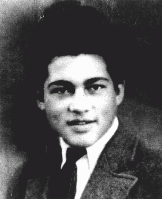
Karl Stojka
Born: April 20, 1931
Wampersdorf, Austria
Karl was the fourth of six children born to Roman Catholic parents in the village of Wampersdorf in eastern Austria. The Stojkas belonged to a tribe of Roma ("Gypsies") called the Lowara Roma, who made their living as itinerant horse traders. They lived in a traveling family wagon, and spent winters in Austria's capital of Vienna. Karl's ancestors had lived in Austria for more than 200 years.
1933-39: Karl grew up used to freedom, travel and hard work. In March 1938 his family's wagon was parked for the winter in a Vienna campground, when Germany annexed Austria just before his seventh birthday. The Germans ordered his family to stay put. Karl's parents converted their wagon into a wooden house, but he wasn't used to having permanent walls around him. His father and oldest sister began working in a factory, and Karl started grade school.
1940-44: By 1943 Karl's family had been deported to a Nazi camp in Birkenau for thousands of Roma. Now they were enclosed by barbed wire. By August 1944 only 2,000 Roma were left alive; 918 of them were put on a transport to Buchenwald to do forced labor. There the Germans decided that 200 of them were incapable of working and were to be sent back to Birkenau. Karl was one of them; they thought he was too young. But his brother and uncle insisted that he was 14 but a dwarf. Karl got to stay. The rest were returned to be gassed.
Karl was later deported to the Flossenbürg concentration camp. He was freed near Roetz, Germany, by American troops on April 24, 1945. After the war, he returned to Vienna.

